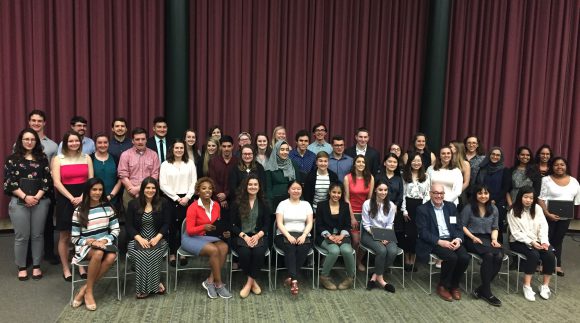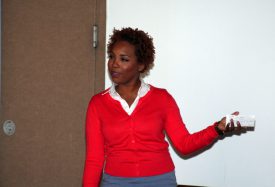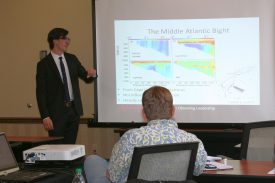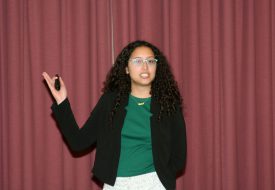
George H. Cook Scholars after the presentation of their theses. It’s the last stop in a year-long process of independent planning and research that begins in the spring semester of each student’s junior year.
On April 13, 55 George H. Cook Scholars, along with five students from the University of Sao Paulo, Brazil, presented their senior thesis in the Cook Student Center.

Gloria Blaise (SEBS’18) giving her presentation, “The Impact of forest Usage and Accessibility on the Perceptions of its Users and Surround Residents.”
The scholars program is directed by Malcolm Watford, professor in the Department of Nutritional Sciences, while Janice Geiger serves as the administrative assistant.
In order to be eligible for the George H. Cook Scholars Program, undergraduate applicants must be in the top 15% of their class with a 3.45+ GPA. Students who achieve a 3.00 GPA are also eligible for the program if they are nominated by a SEBS faculty member. Their honors projects must exhibit independence and originality, and the presentations are opportunities to showcase their passion and ability to conduct independent research.

Samuel J. Coakley (SEBS’18) presenting “Interannual Variability and Trends in the Mid-Atlantic Bight Cold Pool,” with distinguished professor Oscar Schofield.
Students who are accepted into the program are awarded a faculty project advisor of their choosing at the beginning of the process. This advisor helps in the planning and research of the student’s project. For many of these students, it is the first time they are venturing into their scientific field on their own. Research requires soft skills like problem solving and critical thinking to overcome obstacles encountered throughout the process.
Each student’s presentation and thesis defense is a test of their public speaking skills, a necessary skill for properly communicating their research to an audience, the practice of which builds confidence. A member of the George H. Cook Honors Committee serves as session chair for each scientific category. The session chair is accompanied by a reviewer handpicked by the presenting student.

Rachel Rodrigues (SEBS’18) giving her presentation on “The Benefits of Antioxidants in Fruits and Vegetables; A Program Intervention for High School Students.”
During their theses defense, presentations were made in all areas of science, from biotechnology and plant science to nutritional and marine and coastal sciences. Faculty advisors, reviewers and students were treated to discourses on the ecological connections between Rutgers University Golf Course and the surrounding landscape, the benefits of antioxidants in fruits and vegetables, the effect of proximity to females on integument damage caused by self-enurination in the male goat, the interannual variability and trends in the Mid-Atlantic bight cold pool and dozens of other complex and fascinating subjects.
Once the scholar’s research is completed and they have presented their honors thesis, they have completed the program and are granted a scarlet-colored honors cord to wear on the day of graduation. So on this day of SEBS convocation, we congratulate the 2018 George H. Cook Scholars for their hard work and know they will continue to show their Scarlett Promise in the years to come.

